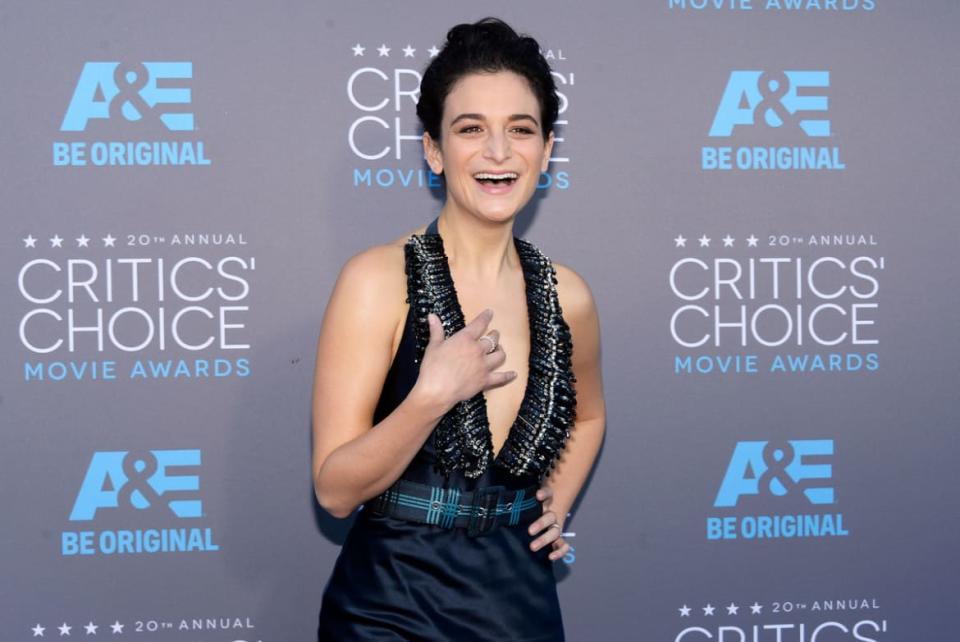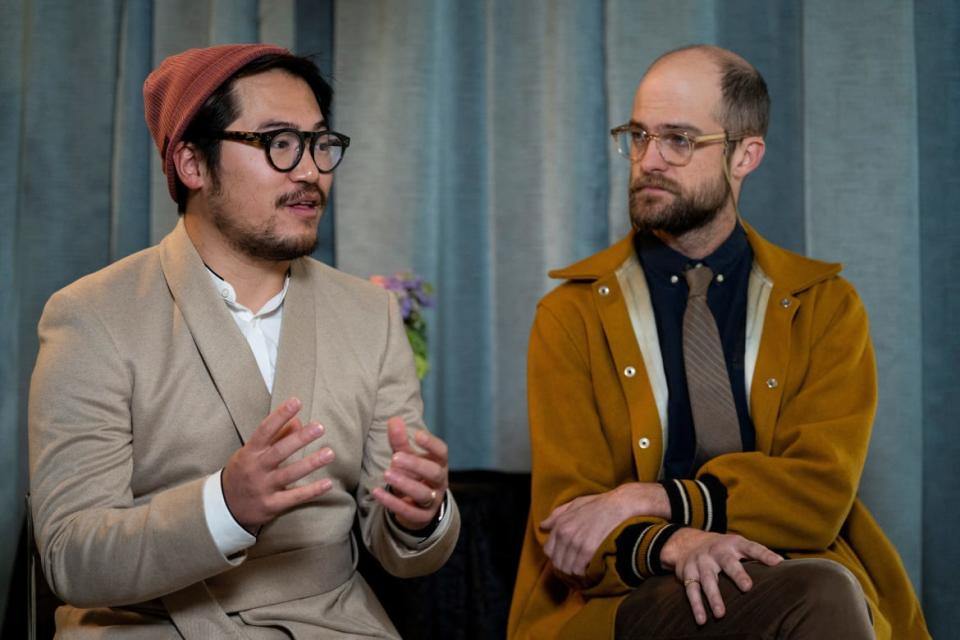‘Everything Everywhere’ Deserves Best Picture. But We Can’t Ignore Its Biggest Flaw.

On Feb. 26, Everything Everywhere All at Once dominated the Screen Actors Guild Awards, winning best supporting actor, best supporting actress, best actress, and the big award of the night, best motion picture cast. That’s a record-breaking four acting wins for one film at the ceremony. Combine that with the top prizes at the Producers Guild and Directors Guild Awards, and Oscar domination is all but guaranteed.
That’s an exciting prospect, and not one many would have predicted when EEAAO came out all the way back in March 2022. Its odds of making any awards impact at all felt slim. Early calendar releases rarely remain in the awards conversation, let alone one starring primarily Asian actors.
Put simply, there’s a lot of EEAAO that’s worth celebrating. It’s an adventurous, enthusiastic, highly unusual film. People often lament the lack of creativity in American cinema these days, wondering why all they see are endless barrages of sequels and remakes. But EEAAO is a thrilling reminder that original storytelling still exists, and that it can be profitable. It’s the highest-grossing film released by big-deal indie distributor A24 to date, earning over $100 million. That’s an incredible number for an independent film.
The Michelle Yeoh Moment With ‘Everything Everywhere All at Once’ Is Already Changing Hollywood
A lot of people—myself included—are overjoyed by the prospect of Michelle Yeoh, Ke Huy Quan, and Jamie Lee Curtis walking away with long-coveted Oscars, along with the countless other accolades the film is sure to receive. But there remains a nagging problem that lies at the heart of EEAAO, best summarized in two words: “Big Nose.”
If you haven’t seen the film, you may not understand what I’m referring to. Even if you have, so much happens that you’d be forgiven for forgetting any small detail. Big Nose is a character in the film played by Jenny Slate, who’s introduced on-screen by Evelyn (Michelle Yeoh) reacting in shock when she sees her. She says of the character, “Wow, what a big nose.” From there, Evelyn tells her husband to give a pile of dry cleaning to “the customer with the big nose.”

Actress Jenny Slate arrives at the 20th Annual Critics’ Choice Movie Awards in Los Angeles, California, Jan. 15, 2015.
“What’s the big deal,” you may be wondering. Lots of people have big noses! That’s certainly true. But one of the most long-standing antisemitic tropes is that Jewish people are identifiable by their supposedly big noses. And Jenny Slate is a Jewish actress.
To me, as a viewer, this was immediately appalling. Yet the conversation around the film rarely involves or interrogates the fact that one of the characters in the film is a walking Jewish American Princess stereotype, known only by a facial feature closely tied to prejudiced beliefs. Frankly, the lack of discourse around “Big Nose'' may be due to the larger narrative surrounding the film—it’s overwhelmingly positive. EEAAO has become the film to root for this awards season, and pointing out its flaws goes against that.
While I have no interest in taking down the film—I really did enjoy it, for the most part—I can’t just let antisemitism go unchecked.
Mark Wahlberg’s History of Hate Crimes Resurfaces After ‘Everything Everywhere All at Once’ SAG Win
The trope of the big-nosed Jews dates back centuries ago. It was especially common during World War II, when Nazi propagandists would draw caricatures of Jews with big, hooked noses to dehumanize them. In a researched article on the trope’s history, one academic explains that “it is a technique used to stir up a sense of disgust and repulsion towards Jews, either collectively or individually, and is often found alongside other antisemitic motifs.”
Since then, many Jews have reclaimed the untrue stereotype of the big nose. Yes, some of us have large noses, but there is no correlation whatsoever between Jews and big noses. Having a large nose has been a great source of shame for some Jewish people, due to its usage by hate groups to tear us down. But icons like Barbra Streisand have led the charge toward being proud of having a larger nose. As she said in a 1977 Playboy interview, “The first thing someone would have done would be to cut my bump off. But I love my bump.”
Meanwhile, Slate herself has said that she doesn’t have any problem with her character. “They explained it to me right away, so I never felt it was antisemitic,” she said, in a recent interview with The Independent. “I thought it was funny.” Slate’s opinion is entirely valid, and I’m glad she felt supported and not stigmatized. I’m an enormous fan of her work, and I was delighted to see her in EEAAO. But it doesn’t make the way her character is conceived and treated sit any better with me.
In a later scene, Big Nose is seen in an amusing brawl with Evelyn in the multiverse, where she uses her dog as a weapon. Bizarrely, we learn that the dog has a name—Johnny—but we still don’t know anything about Johnny’s owner. The scene between the two of them provides an opportunity for Evelyn to grow from her prejudiced comments, but instead, a dog ends up receiving more humanity than Slate’s character.
What we see in EEAAO is nothing close to a reclamation of having a bigger nose. In fact, it’s the opposite: Evelyn defines Slate’s character only by the size of her nose, diving headfirst into a well-worn antisemitic trope.
It feels disingenuous, especially since Evelyn’s character rehabilitation is so essential to what makes EEAAO special. Evelyn’s prejudice is part of who she is, and the film goes a long way to allow Evelyn to make amends with the people she has wronged—especially her daughter Joy, played by Stephanie Hsu. A core part of the movie lies in their evolving relationship, which illustrates the power of how seeing things in a new light can expand our minds and ourselves. Evelyn thinks of Joy as a disappointment, something she tells her without hesitation. She’s also deeply uncomfortable with the fact that Joy is a lesbian.
Evelyn and Joy better understand and accept each other by the film’s end, with Evelyn in particular learning to care for and respect the people around her in new ways. But when it comes to her treatment Slate’s character, Evelyn experiences no such growth. Evelyn’s multiple remarks about “Big Nose” are left to hang like a toxic cloud over the film, with no resolution.
It’s especially frustrating, because Slate’s character is so over the top that Evelyn could have picked up on so many different things. Evelyn could have mocked how loud and obnoxious she was being on the phone, while also talking to Evelyn at the same time. Or what about her gaudy clothes? The easiest and funniest target is hiding in plain sight: She has a dog in her stroller. The fact that she walks her dog around like a baby is an infinitely more amusing thing to mock, and it’s surely something that Evelyn wouldn’t hesitate to make fun of. So why the nose?
All of these issues are punctuated by the film’s end credits, which list Jenny Slate’s character as—you guessed it—Big Nose. This was likely done because it’s the only name she’s called by in the movie; people likely wouldn’t recognize who the character was in the film if they assigned her a random name. But the decision to not even dignify Slate’s character with a name feels particularly callous, refusing to give the character a shred of humanity.
Seeing “Big Nose” appear in the credits felt like a sick joke, a gut punch that a movie that does so many things well—including showing how growth and tolerance can make the world a better place—except for Jews.

Daniel Kwan with Daniel Scheinert, known as Daniels, directors and writers of Everything Everywhere All At Once, attend the Oscars Luncheon at The Beverly Hilton in Los Angeles, California, U.S., Feb. 13, 2023.
Credit where it’s due: Directors Daniel Kwan and Daniel Scheinert (a.k.a. the Daniels) profusely apologized for the name upon initial criticisms, back when the film was released. “One of the weird blind spots that happened was that in Chinese culture, everyone who is white is called ‘Big Nose,’” explained Kwan in an interview with Digital Spy last May. “It’s nothing to do with the Jewish people, which now we’re realizing, ‘Oh, fuck.’” The Daniels also explained that there was more to Slate’s character, and there was a redemption filmed, but it ended up on the cutting room floor. For the digital release of the film months later, Slate’s character's name was changed from “Big Nose” to “Debbie the Dog Mom.”
That’s nice to hear, and I’m glad that the Daniels expressed understanding and remorse and took a (minor) step to help rectify the issue. But that doesn’t make the “Big Nose” character any less troubling, and it certainly doesn’t absolve the film of including the stereotype. Whether the cut footage would have alleviated the antisemitic undertones is impossible to know, and the fact that the stereotype’s meaning in Chinese culture differs from that elsewhere doesn’t make it sit any less uncomfortably. In an era that so regularly calls out discrimination, it’s disappointing to see this issue largely swept under the rug—disappointing, but not surprising.
Get the Daily Beast's biggest scoops and scandals delivered right to your inbox. Sign up now.
Stay informed and gain unlimited access to the Daily Beast's unmatched reporting. Subscribe now.

 Yahoo News
Yahoo News 
